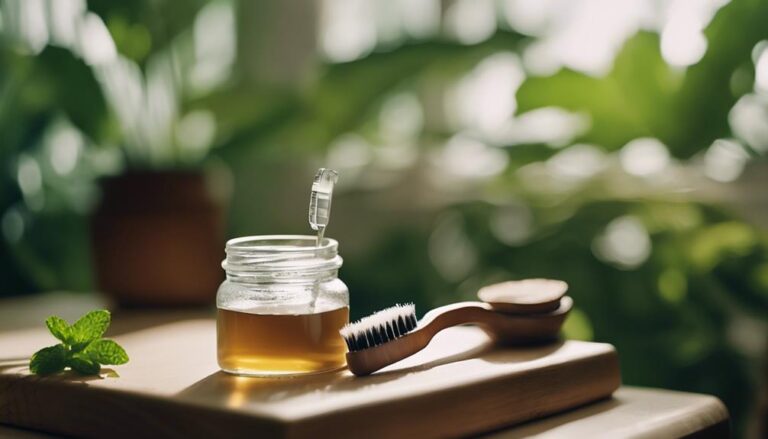I suggest trying herbal mouthwashes to combat gum disease and halitosis effectively. Homemade solutions with natural ingredients like tea tree oil and peppermint oil can reduce plaque and freshen breath. Oil pulling with coconut oil and essential oils like tea tree oil promotes healthier gums and fresher breath. Aloe vera‘s soothing and antibacterial properties benefit oral health by reducing inflammation and freshening breath. Turmeric paste, saltwater rinses, and baking soda mouthwash also aid in promoting gum wellness and combating oral bacteria. Cranberry juice and peppermint oil offer antioxidant and antibacterial benefits for overall oral health improvement. These natural remedies harness the power of nature for healthy gums and fresh breath.
Key Takeaways
- Herbal mouthwash with tea tree oil fights gum disease and bad breath effectively.
- Coconut oil pulling reduces harmful bacteria for fresher breath and healthier gums.
- Aloe vera’s anti-inflammatory and antibacterial properties promote oral health.
- Turmeric paste and saltwater rinse combat inflammation and promote gum wellness.
- Peppermint oil freshens breath and fights bacteria naturally, enhancing oral hygiene.
Herbal Mouthwash Solutions
Regularly incorporating herbal mouthwash solutions into your oral hygiene routine can help combat gum disease and halitosis effectively. Herbal mouthwash alternatives offer natural ingredients for mouth rinse, making them excellent homemade solutions. DIY recipes can be tailored to individual preferences and needs, ensuring a personalized approach to oral care.
Herbal mouthwashes often contain ingredients like tea tree oil, peppermint oil, and chamomile, known for their antibacterial and anti-inflammatory properties. These components can help reduce plaque buildup, soothe gum irritation, and freshen breath. For instance, a simple recipe could involve mixing a few drops of tea tree oil and peppermint oil with water as a base.
Research suggests that herbal mouthwashes can be as effective as commercial ones in reducing gum bleeding and inflammation. However, consulting with a healthcare provider or a dentist before incorporating any new oral hygiene products, especially if you have specific oral health conditions, is crucial. Experimenting with different herbal combinations can help find the most suitable solution for maintaining excellent oral health.
Oil Pulling Techniques
Implementing oil pulling techniques can provide a natural and effective way to improve oral health and combat gum disease and halitosis. Coconut oil pulling is a popular method where a tablespoon of coconut oil is swished around the mouth for about 15-20 minutes before spitting it out. This process helps to reduce harmful bacteria in the mouth, promoting healthier gums and fresher breath. Additionally, incorporating essential oils like tea tree oil or peppermint oil into the oil pulling routine can provide extra benefits for gum health due to their antibacterial properties.
In addition to oil pulling, tongue scraping benefits are also worth mentioning. Tongue scraping helps to remove bacteria, food debris, and dead cells from the tongue’s surface, reducing the risk of bad breath and improving overall oral hygiene. When combined with proper mouthwash techniques, such as using alcohol-free and natural mouthwashes, oil pulling can be even more effective in maintaining gum health and combating halitosis. Oil pulling techniques, when done regularly and correctly, can be a valuable addition to your oral care routine.
Aloe Vera for Oral Health
Aloe Vera, renowned for its soothing properties, offers promising benefits for maintaining oral health and combating gum disease and halitosis. The healing properties of aloe vera make it a valuable addition to oral care routines. Aloe vera contains vitamins, minerals, and anti-inflammatory compounds that can help reduce inflammation in the gums and fight bacteria that cause gum disease. Its natural antibacterial properties can assist in freshening breath and promoting overall oral health.
Using aloe vera gel directly from the plant or a trusted organic source can help soothe irritated gums and aid in the healing process. Regularly applying a small amount of aloe vera gel to the gums and gently massaging it in can provide relief from inflammation and promote healthier gum tissue. Additionally, aloe vera’s ability to neutralize bad bacteria in the mouth can contribute to reducing bad breath.
Incorporating aloe vera into your oral care routine can be a beneficial natural remedy for gum disease and halitosis, supporting overall oral health and hygiene.
Turmeric Paste for Gums
Exploring the benefits of turmeric paste for gum health reveals its potential in promoting gum tissue wellness and combating oral inflammation. Turmeric, known for its anti-inflammatory and antimicrobial properties, can be a valuable natural remedy for addressing gum issues. The active compound in turmeric, curcumin, has been studied for its various health benefits, including its potential in oral health care.
Studies suggest that turmeric benefits oral health by reducing gum inflammation and fighting oral bacteria that contribute to gum disease. Creating a turmeric paste by mixing turmeric powder with water to form a thick consistency can be applied directly to the gums. This paste can help soothe inflamed gums and potentially aid in reducing bacteria levels in the mouth.
While turmeric paste can be a beneficial addition to oral hygiene routines, it’s essential to consult with a healthcare provider or dentist before using it, especially for individuals with existing oral health conditions. Incorporating turmeric paste as a complementary measure alongside regular dental care may contribute to improved gum health and overall oral hygiene.
Saltwater Rinse Benefits
Using a saltwater rinse can provide several benefits for oral health, particularly in promoting gum wellness and combating bacteria in the mouth. Saltwater has natural disinfectant properties that can help reduce inflammation and heal gum tissue. This simple remedy is cost-effective and easy to prepare at home by dissolving salt in warm water.
In addition to its antibacterial effects, a saltwater rinse can aid in removing food particles and debris from between teeth when swished around the mouth. It complements other oral hygiene practices such as gum massage techniques, dental flossing benefits, tongue scraping, and the use of oral probiotics.
To maximize the benefits of a saltwater rinse, it’s recommended to use it regularly as part of a thorough oral care routine. While it may not completely replace traditional dental care, incorporating saltwater rinses can be a valuable addition to promote gum health and maintain fresh breath.
Tea Tree Oil Benefits
Tea tree oil, renowned for its antimicrobial properties, offers numerous benefits for oral health and hygiene. Research has shown that tea tree oil can be effective in combating gum disease and halitosis due to its antibacterial properties. When using tea tree oil for oral care, it is essential to do so with caution as it is highly concentrated and can be toxic if ingested.
Here is a table summarizing the efficacy, safety concerns, and proper usage of tea tree oil for gum health:
| Aspect | Information |
|---|---|
| Research & Efficacy | Studies suggest tea tree oil’s effectiveness in reducing bacteria associated with gum disease. |
| Safety Concerns | Dilute tea tree oil properly to avoid toxicity risks. It should not be swallowed. |
| Usage | Apply a drop of diluted tea tree oil to the gums or use a toothpaste containing this ingredient. |
It is important to consult with a healthcare professional before incorporating tea tree oil into your oral hygiene routine, especially if you have any existing oral health conditions or are pregnant.
Vitamin C for Gum Health
To enhance gum health, incorporating Vitamin C into your daily oral care routine is a beneficial strategy. Vitamin C is essential for collagen production, a key component in maintaining healthy gums. Citrus fruits like oranges, lemons, and grapefruits are rich sources of Vitamin C and can easily be included in your diet to support gum health.
Vitamin C helps in repairing and maintaining the health of gum tissues, reducing inflammation, and preventing gum disease. If you find it challenging to consume enough Vitamin C through your diet, you may also consider taking collagen supplements, which can further support your oral health by promoting gum tissue strength and integrity.
Ensuring an adequate intake of Vitamin C through natural sources or supplements can contribute to stronger gums, reduced bleeding, and overall improved oral health. Remember, a balanced diet rich in Vitamin C isn’t only beneficial for your gums but also for your overall well-being.
Cranberry Juice Benefits
Incorporating cranberry juice into your daily routine can offer various benefits for gum health and oral hygiene. Cranberry juice is well-known for its high content of antioxidants and nutrients that support overall health, including oral health. Specifically, cranberry juice can aid in preventing gum disease by reducing the formation of plaque and fighting bacteria in the mouth. The benefits of cranberry juice extend beyond just preventing gum disease; it can also help freshen breath and promote a healthier oral environment.
Below is a table summarizing the key benefits of cranberry juice for oral health:
| Benefit | Description |
|---|---|
| Antioxidant Properties | Helps fight free radicals in the mouth that can lead to gum disease |
| Anti-bacterial Effects | Reduces harmful bacteria in the mouth, promoting healthier gums |
| Plaque Prevention | Inhibits the formation of plaque on teeth, aiding in gum disease prevention |
| Freshens Breath | Natural properties can help combat bad breath, enhancing oral hygiene |
Incorporating cranberry juice into your diet can be a simple and tasty way to support your gum health and overall oral hygiene routine.
Baking Soda Mouthwash
Regularly using a baking soda mouthwash can be an effective way to maintain oral hygiene and freshen breath. Baking soda, also known as sodium bicarbonate, has properties that help balance the pH levels in the mouth, creating an environment less conducive to the growth of bacteria that cause gum disease and bad breath. By mixing a teaspoon of baking soda in a glass of water and swishing it around in the mouth for about 30 seconds, you can help neutralize acids and protect your teeth from decay while also eliminating odors.
This simple and natural remedy is particularly useful for those looking to enhance their oral hygiene routine without using harsh chemicals. Baking soda’s ability to raise the pH in the mouth makes it challenging for bacteria to thrive, promoting healthier gums and fresher breath. Incorporating baking soda mouthwash into your daily oral care regimen can be a cost-effective and convenient way to support overall oral health.
Peppermint Oil for Fresh Breath
Using peppermint oil is an invigorating and natural way to promote fresh breath and maintain oral hygiene. Peppermint oil has been used for centuries due to its antiseptic properties and revitalizing taste. When it comes to oral care, incorporating peppermint oil into your routine can provide numerous benefits. Here are some key points to ponder:
- Freshness Boost: Peppermint oil leaves a long-lasting, minty freshness in your mouth, combating bad breath effectively.
- Antibacterial Action: The menthol in peppermint oil has antibacterial properties that can help reduce bacteria in the mouth, supporting overall oral health.
- Improved Taste: Adding a drop of peppermint oil to water creates a rejuvenating mouthwash that not only freshens breath but also enhances taste perception.
- Natural Alternative: Peppermint oil offers a natural alternative to commercial mouthwashes, free from artificial ingredients and chemicals.
- Convenience: A small bottle of peppermint oil is easy to carry around, allowing you to freshen up your breath on the go.
Frequently Asked Questions
Can Essential Oils Be Used as a Substitute for Herbal Mouthwash Solutions?
Yes, essential oils can be used as substitutes for herbal mouthwash solutions. Their aromatherapy benefits offer natural remedies for halitosis. However, essential oil safety is important; always dilute properly and be cautious of ingestion risks.
Is Oil Pulling Safe for Individuals With Sensitive Gums?
Oil pulling can be safe for individuals with sensitive gums if done gently. It can improve gum health by reducing bacteria and inflammation. Consider using natural remedies like coconut or sesame oil for a soothing and effective treatment.
Are There Any Side Effects of Applying Turmeric Paste on Gums?
When using turmeric paste on gums, caution is necessary. While turmeric offers benefits for gum health, there can be side effects like staining. I recommend consulting a dentist before applying turmeric paste for gum issues.
How Often Should Saltwater Rinses Be Used for Optimal Results?
For best results, saltwater rinses should be used daily. The benefits include reducing inflammation and bacteria in the mouth. However, excessive use may lead to dry mouth. I recommend consulting a dentist for personalized frequency recommendations.
Can Cranberry Juice Be Used as a Replacement for Baking Soda Mouthwash?
While cranberry juice offers benefits like fighting bacteria, it may not fully replace baking soda mouthwash. Baking soda’s alkaline properties benefit oral health by neutralizing acids. Consider combining both for a balanced approach to oral hygiene.
Conclusion
Incorporating natural remedies into your oral care routine is like giving your gums and breath a soothing hug from Mother Nature.
From herbal mouthwashes to turmeric pastes, these solutions can help combat gum disease and halitosis in a gentle and effective way.
So why not give these remedies a try and let the healing powers of nature work their magic on your oral health?
Your gums and breath will thank you!






